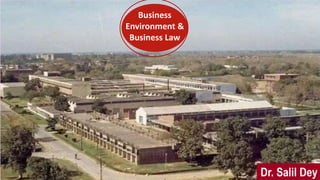
Internal Environment.pptx
- 1. Business Environment & Business Law Dr. Salil Dey
- 2. Business Environment Business environment consists of all those factors that have a bearing on the business such as strength, weakness, government policies, regulations, economic conditions, cultural factors, global trends etc.
- 3. Business Environment The success of a business firm depend on inner strength, resource at command which includes physical resources, Financial resources, human resources , synergy and skill. It also depend on its adaptability to the environment and the extent to which the environment is favourable to the development of the organization.
- 4. Business Environment Types of Environment: 1. Internal Environment 2. External Environment Business Decision Internal Environment External Environment
- 5. Internal Environment 1. Value system 2. Vision, Mission and objectives 3. Management structure and Nature 4. Internal Power relationship 5. Human Resources 6. Company Image and Brand Equity 7. Physical Assets and Facilities 8. Marketing Resources 9. Financial Factors
- 6. Value System It is the moral values company possess and practices through out the organization. Value system comes from the founder of the organization.
- 7. Vision, Mission & Objectives Vision: Mission Objectives:
- 8. Management structure and Nature Structure of the management body plays a vital role on influencing business decisions. Share holding pattern also plays vital role in decision making.
- 9. Internal Power Relationship Relationship among board of directors play a vital role in decision making. The relationship between the chief executives and Board members is also a critical factor.
- 10. Human Resources The characteristics of the Human Resources like skill, commitment, attitude etc contribute to the strength and weakness of the organization
- 11. Company Image and Brand Equity Image of the company matters while raising funds, making alliance with other companies, new product launching etc.
- 12. Physical Assets and Facilities Competitiveness of a company also depends upon the availability of physical assets and its facilities.
- 13. Marketing Resources Availability of marketing personnel, distribution network have direct bearing on marketing efficiency.
- 14. Financial Factor Financial factors like financial policies, financial position and capital structure are also important internal environment affecting business performances.
- 15. SWOT Analysis 1. Internal to Organization - Strength - Weakness 2. External to Organization: - Opportunity - Threat.
- 16. SWOT Analysis Strength Questions: • What do customers love about your company or product(s)? • What does company do better than other companies in your industry? • What are most positive brand attributes? • What’s unique selling proposition? • What resources do company have at your disposal that your competitors do not?
- 17. SWOT Analysis Weakness questions • What do your customers dislike about your company or product(s)? • What problems or complaints are often mentioned in your negative reviews? • Why do your customers cancel order? • What could your company do better? • What are your most negative brand attributes? • What are the biggest obstacles/challenges in your current sales funnel? • What resources do your competitors have that you do not?
- 18. SWOT Analysis Opportunity questions: • How can we improve our sales/customer onboarding/customer support processes? • What kind of messaging resonates with our customers? • How can we further engage our most vocal brand ? • Are we allocating departmental resources effectively? • Is there budget, tools, or other resources that we’re not leveraging to full capacity? • Which advertising channels exceeded our expectations – and why?
- 19. SWOT Analysis Threats questions: When it comes to threats, you could certainly begin by asking a series of questions like those above. However, it’s often quite easy to come up with a list of potential threats facing your business or project without posing questions beforehand. This could include “branded” threats such as emerging or established competitors, broader threats such as changing regulatory environments and market volatility, or even internal threats such as high staff turnover that could threaten or derail current growth.
- 20. SWOT Analysis